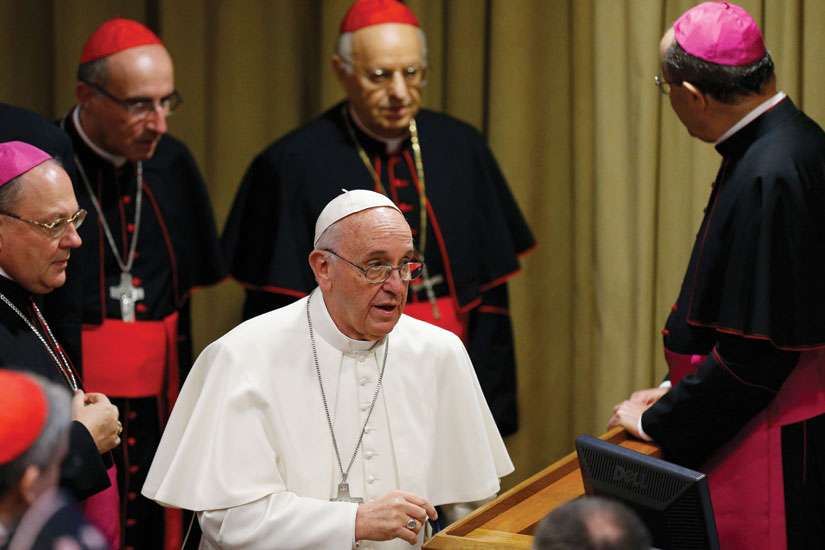As bishops discuss how the Church can speak to families and what it should say, Routhier is watching the reforms of Vatican II take hold as Pope Francis, cardinals and bishops of the world struggle with how to make a decision.
“I think that we place very important attention on the decision taking,” said the theologian at Quebec City’s Laval University. “But not on the decision making, which also is very important. Obviously, decision taking will be the decision of the Pope.
“But by the way he is acting, it is about the process — as he said in Evangelii Gaudium — the processes are also important.”
At the end of the first week of deliberations at this second Synod to discuss modern family life in the course of a year, bishops expressed confusion over the process. After 13 discussion circles divided by language (English, French, Italian, Spanish, Portuguese and German) had met, delegates to the Synod were asking whether their job was to write a report to be distributed directly to the faithful or whether they were simply to provide advice to the Pope, who would then produce an apostolic exhortation that would function as a final report.
“It’s good to be confused once in a while,” said Philippine Cardinal Luis Antonio Tagle, one of the presidents of the Synod. “If things are always clear, then we might not be in real life any more.”
In every Synod since 1974 the final report of each took the form of a papal apostolic exhortation. Evangelii Gaudium, written by Pope Francis, was the final report from the 2012 Synod on the New Evangelization. The first post-Vatican II Synod of bishops in 1967 on preserving and strengthening the Catholic faith produced no final document. In 1971 the Synod on the Ministerial Priesthood and Justice in the World produced a final document called Justice in the World written collaboratively by the bishops.
With the first of three weeks under their belt, the 2015 Synod fathers are unsure what this Synod will produce and what their role will be.
“At times our work has seemed more muddled than methodical,” wrote Australian Archbishop Mark Coleridge on behalf of the Synod’s English Group C. “Our hope is that focus, if not perfect clarity, will emerge as the Synod unfolds and we become more assured about both task and method.”
Toronto’s Cardinal Thomas Collins chaired Group D, fourth of four English-language circles.
“To address the many issues that we have discussed will take more than the first week or even the three weeks of the Synod,” said the Group C report. “A longer journey stretches before us, just as an earlier journey has led us to this point — not just from late 2013 when Pope Francis announced the journey of the two Synods but from the Second Vatican Council and all that led to it.”
In fact, what the bishops find themselves doing at the Synod is a process of Church reform, said Routhier.
“To change the mentality, it is a long process,” he said. “A decree can’t do that.”
The change we are seeing over the two Synods on the family is a change of Church culture in which the bishops are showing how the Church can grow through open and honest dialogue, Routhier believes.
“Under John Paul II for instance, there were questions not allowed to be discussed at the Synod,” he said. Which is not the case any more.
Free speech is dangerous, unless it is placed in its proper Gospel, pastoral context.
“It is important to have the freedom to speak, but this freedom we should exercise with charity,” said Routhier. “Not trying to blast the others.”
The discussion isn’t for discussion’s sake, said Routhier. It is a way of seeking the truth for the good of all the Church and its people.
“As we don’t have the custom to discuss freely, the way some are doing it now, it is simply to attack the others,” he said.
“But not to try as Francis has tried to implement it as a discernment process. If we are only defenders of what we think the Gospel is, or what we think tradition is, we are not pastors any more who are seeing people and sharing their feeling and sharing their difficulties.”
(With files from CNS.)


